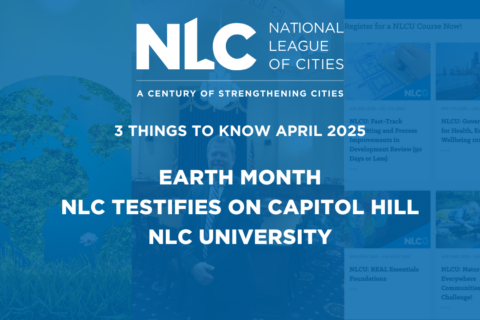Federal agencies such as Federal Emergency Management Agency (FEMA) are growing increasingly supportive of pre-disaster hazard mitigation and climate preparedness. That is, communities used to have to wait for a disaster to occur in order to receive funds. However, as climate disasters grow in frequency and intensity, federal funding and technical assistance are available for cities, towns and villages to plan and fund projects in advance of extreme events.

Planning for extreme events today protects lives, prevents losses and reduces disruptions when disasters strike. Based on findings from the National Institute of Building Sciences’ Natural Hazard Mitigation Saves 2019 Report, benefit-cost ratios range from 2:1 for building retrofits in fire-prone areas all the way to 10:1 when communities adopt codes for wind hazards.
Direct funding to support transformative or much-needed infrastructure upgrades will soon be available through the recently passed Infrastructure Investment and Jobs Act (IIJA) (P.L. 117-58). Cities and towns can also use the recently disbursed State and Local Fiscal Recovery Funds authorized by American Rescue Plan Act funds (ARPA) to improve water infrastructure and build resilience to climate change with some flexibility.
One steady funding source that has emerged in the last two years is the Building Resilient Infrastructure and Communities (BRIC) from FEMA which supports “states, local communities, tribes, and territories and they undertake hazard mitigation projects, reducing the risks they face from disasters and natural hazards.”
The fund’s guiding principles include supporting communities through:
- Capacity-building
- Encouraging and enabling innovation
- Promoting partnerships
- Enabling large projects
- Maintaining flexibility
- Providing consistency
Grant writing, resiliency planning and generally getting all your ducks in order for federal resilience-building grants require a certain amount of planning in and of itself. To help, FEMA has created the BRIC Direct Technical Assistance (DTA) program to help smaller communities and those with less staff capacity with free advice and support.
FEMA’s BRIC DTA program was designed for eligible communities who need support in developing resilience capacity and are interested in applying for BRIC and other resilience grant funding. A Letter of Interest for the BRIC DTA program is due on January 28, 2022. This free technical assistance will last for up to 36 months.
What communities qualify for FEMA’s free technical assistance?
- All cities, towns, townships, counties, special district governments
- Tribal governments, including both federally recognized tribal nations and non-federally recognized tribal governments
- A hazard mitigation plan is not a prerequisite to apply.
What communities should apply?
- Those with a desire to increase their capacity and capability to conduct mitigation activities
- Communities looking to increase resilience to natural hazards
- Those that need help identifying projects that will reduce risk
- Communities that need support developing or submitting a BRIC application
The application process is quick and straightforward:
Write a 1 or 2-page Letter of Interest that includes the following:
- Community point of contact name, position, email, address and phone number
- Description of the community’s need for Direct Technical Assistance
- Description of the community’s capacity to assist in the DTA activity, including committed staff
- Objectives and timelines, including the duration (up to 36 months) of technical assistance
- Community point of contact information including name, position, email, address and phone
Letters of Interest (1-2 pages) are due by January 28, 2022 at 3:00 PM EST.
Email your Letter of Interest to FEMA-BRICDirectTechnicalAssistance@fema.dhs.gov.
To learn more about this free FEMA program, please contact FEMA-BRICDirectTechnicalAssistance@fema.dhs.gov.
Let NLC deliver for you!
The National League of Cities (NLC) is your partner in recovery. This is the time for America to do more than survival we can thrive.
NLC is a strategic partner for local leaders and municipal staff, serving as a resource and advocate for communities large and small. Click the button to learn how NLC can help deliver for your city.








